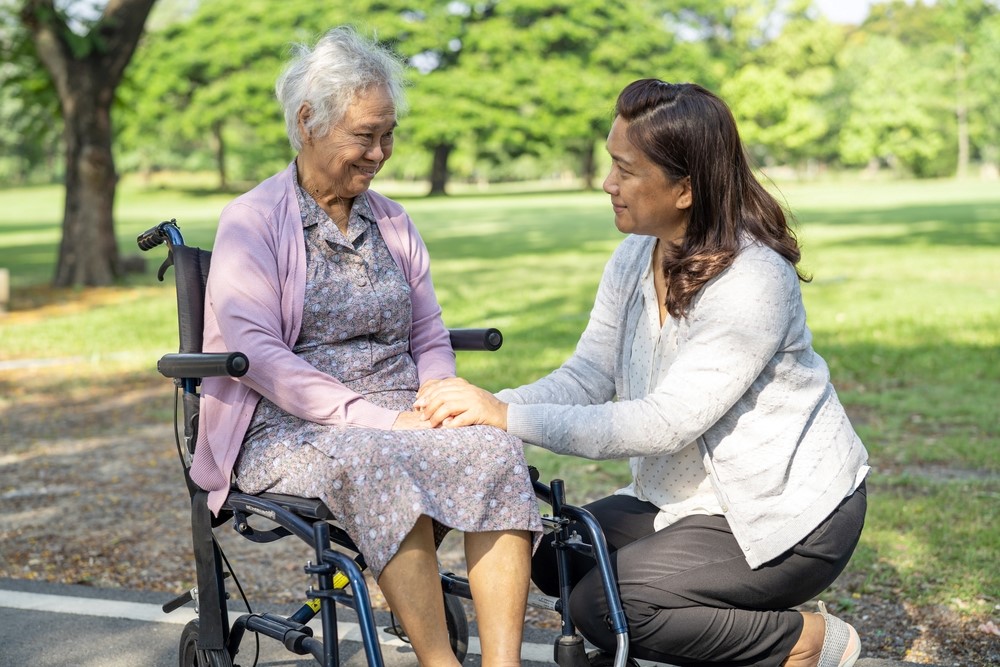
What is it like to provide care when you don’t want to? To feel that you’ve been forced to be a caregiver, that you’re trapped in a circumstance that you can’t stand, with no exit in sight.
This isn’t a unique situation. It’s not even an unusual one.
Some caregivers aren’t even supporting loved ones. They’re looking after parents or parents-in-law that they have little affection for, perhaps even ones who were abusive in the past.
Other caregivers do love the people they’re supporting but feel like they’ve given up too much. What if you’ve quit your job, moved back home, and narrowed your life to try and support an aging parent who is completely unappreciative?
This is the reality for some caregivers. Perhaps more often than we know.
Reluctant Caregivers Aren’t Bad People
If you’re in this camp, you might feel guilty.
After all, many other caregivers seem content enough with their role. Stressed, yes, but also talking about ideas like ‘feeling blessed’ and ‘finding purpose in contribution’.
There’s also huge judgment around this area. We’re told that we should want to support our loved ones. That we should be doing more and be happy about it.
But, social expectations are often completely unrealistic. They don’t consider the nuances of being human or all the differences between us.
So, let’s be clear.
There’s nothing wrong with you if you don’t want to be a caregiver or if you feel resentment. There may even be moments where you wish your loved one would die.
That sounds horrible, I know, yet countless caregivers have that thought occasionally. There’s nothing wrong with it. Our brains do that – think inappropriate things at times. That doesn’t make us bad or wrong.
Just human.
And, there are plenty of very good reasons why you mightn’t want to be a caregiver.
Perhaps your family member was abusive (or is currently abusive). Perhaps you’ve only just got your life on track. Perhaps you’re dealing with depression and can barely cope with your own needs.
I could go on.
The point is simply that caregiving isn’t always the right decision.
We’re All Different
There’s also a personality aspect to caregiving.
Some people are just wired this way. They naturally connect with caregiving, so it’s much easier for them to thrive in the role.
Such caregivers often naturally give and find joy in it. They’re the ones who emotionally light up when they support others. They’ll often give without even thinking about it.
Natural caregivers still struggle. They still get overwhelmed, can burn out, feel resentment at times, and all the rest (indeed, being a natural caregiver has its own set of challenges, like increasing the risk that you’ll give too much). But, their natural affinity to caregiving makes the role a little easier and helps them to find their center within it.
Being like this isn’t something you control.
You’re not a bad person because your personality doesn’t lean towards caregiving.
Can You Be Forced To Be A Caregiver?

So, here’s an interesting thing.
Most caregivers aren’t literally forced into the position. No one held a gun to your head and said that you must be a caregiver or you’ll die.
And, most of the time, you’re not legally obligated to support your family members, even if things get dire. Some states do have filial responsibility laws, but they’re rarely enforced and only apply in very specific situations.
Even if there is a relevant law, it’s not going to force you to provide care yourself. It’s more likely that you’ll need to contribute financially – and only if you have the money to do so.
You might feel forced though.
Society and family members often bully people into the role.
You may have felt constant pressure to become the senior’s support, regardless of what you need to give up to do so.
The situations below are all common patterns
- You might be the sibling who lives closest to your parents
- You’re a woman, so it’s assumed you’ll be the one caring for your parents (or even your in-laws)
- You’re emotionally closest to your aging parents
- No one else in the family is willing
- You’re the only child, so there isn’t anyone else
- The senior is insistent, regularly asking for help or saying that they can’t do things independently
- The senior or other family members are emotionally manipulating you into providing care, perhaps by suggesting you’re a bad person if you don’t want to (this type of emotional manipulation is a clear sign to run for the hills).
How Do You Make Things Better?
If you feel forced and stuck in the support role, there’s a crucial question to ask – should you be their caregiver?
Should you keep going down this track and providing the amount of support that you are?
At the very least, if it feels like you’ve been forced to be a caregiver, it’s time to re-evaluate. If you keep going down this path, it should be your choice to do so. Otherwise, any resentment, guilt, and anger is likely to just increase.
There are two big areas to think about here.
The first is whether you should support the senior at all. Second, if you do so, how much support do you provide?
Here are some important aspects to think about.
What Can They Do?
There’s often this huge disconnect between the support someone needs and what they receive.
While some seniors do need much more help than they receive, many are in the opposite position, where loved ones are over-extending themselves in ways that aren’t entirely necessary.
It’s useful to think about what the senior can do for themselves.
Think of it this way… it’s not your job to make life perfect or to make aging easy. Those are both impossible targets.
Instead, the goal is to make things easier and provide support where needs are the greatest. Here are some examples to get you thinking.
- Do you need to check in on them every day? Doing so takes a lot of energy and probably isn’t necessary. You could set them up with a medical alert button if you’re worried and trust that they’ll reach out.
- Should you be their personal chauffeur? This can get frustrating fast, especially if the senior has regular appointments and groups they attend. Even if they can’t drive, there are plenty of other transport options.
- Should you drop everything if they ask? Some people get demanding as they age, perhaps even forgetting that you have a life of your own too. Tasks like fetching milk at 10pm or canceling your plans because they forgot about an appointment can quickly derail your life.
So, think about what the senior is actually able to do for themselves.
Sometimes you’ll need to set up systems to help them, like teaching them how to call a car through Uber or to use a service like Instacart for groceries. While there’s some setup time involved, systems like these can dramatically decrease your workload.
They also promote the senior’s independence, which is powerful for their mental and physical health.
What Can Others Do?
Many families have one sibling that steps up and does the lion’s share of caregiving. Others may send money and visit occasionally. Or, they may do nothing.
Even if you’re an only child, there will be other people in the aging parent’s social circle.
Getting people to help can be difficult. Sometimes though, it all comes down to how you ask. Other times you might need to step back and let other people fill the gaps.
What About Siblings Who Refuse To Help
Siblings that don’t step up and support aging parents have their own reasons. Sometimes this is selfishness, but often it’s because they don’t recognize the senior’s needs.
A great starting point is to simply sit down and talk to them.
It helps to be open-minded here and give each of you the chance to fully talk about what you think your parents need. You might have very different views, so why not learn from each other?
What Are The Other Options?
Even if the senior does need a lot of care and others aren’t willing to step up, you still have options.
Local programs are one approach to consider, including those funded by the state and those funded by Medicaid. Some will even pay for in-home caregiving, meal deliveries, or other critical services.
It may also be time for the senior to move to assisted living or a similar environment, where there are staff to meet their needs.
While seniors are often reluctant to make this move, many end up thriving in assisted living. The distance also gives you the chance to rebuild your own life and provide support when you want to, rather than from a sense of obligation.
And, in some cases, you may simply need to step back.
It’s fascinating really. You’ll often find that solutions present themselves. When you’re no longer doing it all, other people start to scramble to fix things.
You Can’t Make Other People Happy
This is important to understand and easy to forget.
You can’t control how other people feel.
While we react to other people and situations, emotions are incredibly personal.
This means you can’t force someone to be happy if they don’t want to be. And, let’s be honest, some people would rather complain and find fault in everything than be happy.
Indeed, some aging parents don’t just seem impossible to please; they are impossible to please. They will always look at the negative things, as this is just how they are.
You can’t make someone accept your point of view either.
It doesn’t matter how well you argue your case, the decision about how they respond ultimately comes down to them.
There are millions of things that influence their reactions, including their own biases, what they know about the situation, and their personality.
So, if you step away from caregiving or cut back the support you provide, some people may get angry or be judgmental. This doesn’t mean you’re wrong. You have to trust yourself, rather than other people’s reactions.
Final Thoughts
Perhaps the most important idea is this – despite how it feels, you’re not forced to be a caregiver. You still have some options at hand, which can even include simply walking away.
If you do choose to stay, then it’s crucial to find your peace with the idea and find ways to still meet your own needs. This includes not making caregiving the center of your existence. Your life matters too.
If you struggle with some of the ideas in this post or with feelings of guilt, it may be worth looking at where your behaviors come from.
For example, many adults struggle with boundary setting (myself included), because they never learned how to do so as a child. Setting boundaries with a parent can be particularly challenging if you’re still looking for their approval.
The book Setting Boundaries with Your Aging Parents offers some amazing examples and insights, which can help you find a way forward. There’s also Recovering from Emotionally Immature Parents. This book isn’t relevant for every situation, but for the right person, it offers crucial insight into the lessons you learned as a child and why you may be struggling now.
Feeling Overwhelmed?
Check out our Caregiving Consulting service for personalized support and guidance.

Leave a Reply